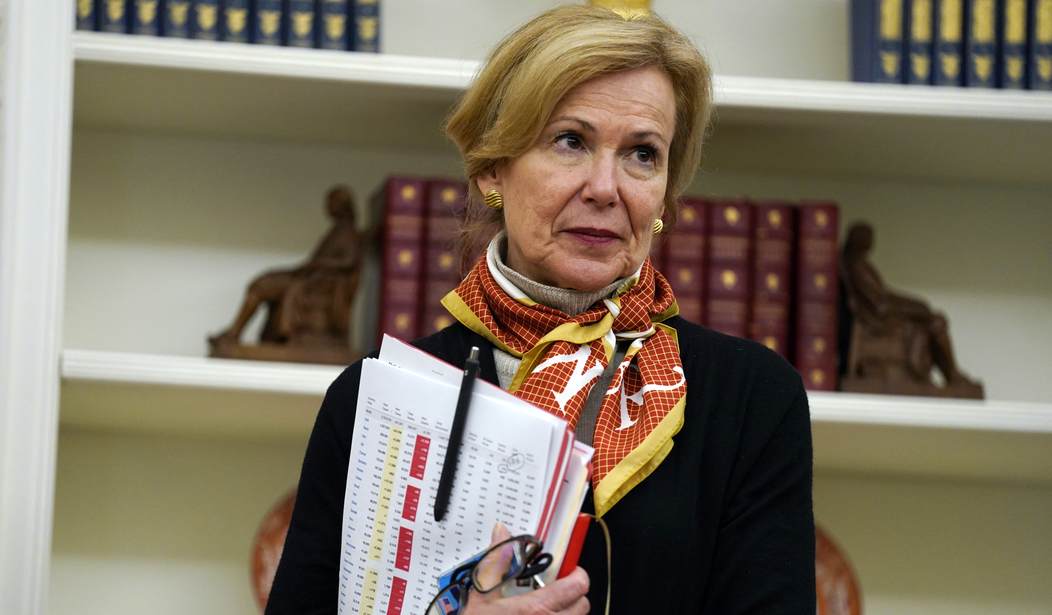Dr. Deborah Birx has not joined President Trump in his revamped, and much shorter coronavirus press briefings yet this week, but that doesn't mean she's been in hiding. She shared some of her own analyses on the state of the U.S. coronavirus outbreak in an interview with Fox News's Bret Baier on Wednesday night after Trump wrapped up his presser at the White House.
Dr. Birx explained that the worst of the outbreak now seems to have moved to the South, southwest and the West. And it's time to reallocate our resources.
"Really we need the northeast and the Midwest that have those very low test positive rates to move to pooling, so that those tests can be moved to the south, the southwest and the west," she explained.
We are in a "very different epidemic than we had in March and April," she said. And it will require additional tests.
Baier, who admitted he kept Dr. Birx on for a few minutes longer than anticipated, also threw in a few questions about some controversial media takes. He presented to her two pieces, one from the New York Times, another from The Washington Post, that made a few assumptions about her, hoping to get her reaction.
The Times piece, Baier noted, called Dr. Birx "the chief evangelist for the idea that the threat from the virus was fading." The host asked his guest what she made of that assessment.
"So I - I’m a data person, so I went back to that very specific day," she answered. "I report out the data every single day. So I went back to that day, and I looked at my report. And my report started out with we are seeing improvements in New York and New Jersey, but we’re seeing increasing concerns and we’re not at peak in Boston or Chicago. We have new concerns in Houston, and we have new hotspots developing in Washington, D.C. and across the South. So, to me, that’s a very balanced report."
Recommended
She added that she was "surprised" by the unfair Times report.
"I was surprised by the piece, because most people will tell you that I err on the other side, that I am too forceful and too direct often about the data and what it’s showing," she reasoned. "And I’ve never actually been called an optimist in that way before, so."
A similarly misleading report from the “Washington Post" read that Birx and others were "frustrated with the CDC’s antiquated system for tracking virus data, which they worried was inflating some statistics – such as mortality rate and case count by as much as 25 percent." The Post also noted that Dr. Birx said there was "nothing" from the CDC that she could trust.
Any truth to that, he wondered?
"So, those are two pieces put together," Dr. Birx explained. "So what is CDC extraordinary about it, what are we using every single day? Their surveillance data, their epidemiologic data, their laboratory data, and their integration of all of that data, and the analysts that are down there as epidemiologists and analysts that provide those reports, I rely on those."
"That comment was about daily hospitalization data," she continued. "When we were first trying to put out Remdesivir, I – it’s important to me that there’s extraordinary equity in how we distribute medication when it’s needed for really, a very specific patient."
"And so we were having a really passionate and compassionate discussion about what’s best for patients. And we were talking about the hospital data and the importance of daily complete reporting, and that’s what we were talking about as the hospital data specifically. The epidemiology data, the surveillance data, the influenza-like illness surveillance data, the emergency room syndromic management surveillance – all terrific, critical. And it’s not just the data, it’s the people they bring to the table to analyze it."
U.S. coronavirus deaths are now over 140,000, and President Trump somberly told us this week that it's going to "get worse before it gets better." Yet, researchers are giving us reason to hope on both the vaccine and the therapeutic front.

























Join the conversation as a VIP Member